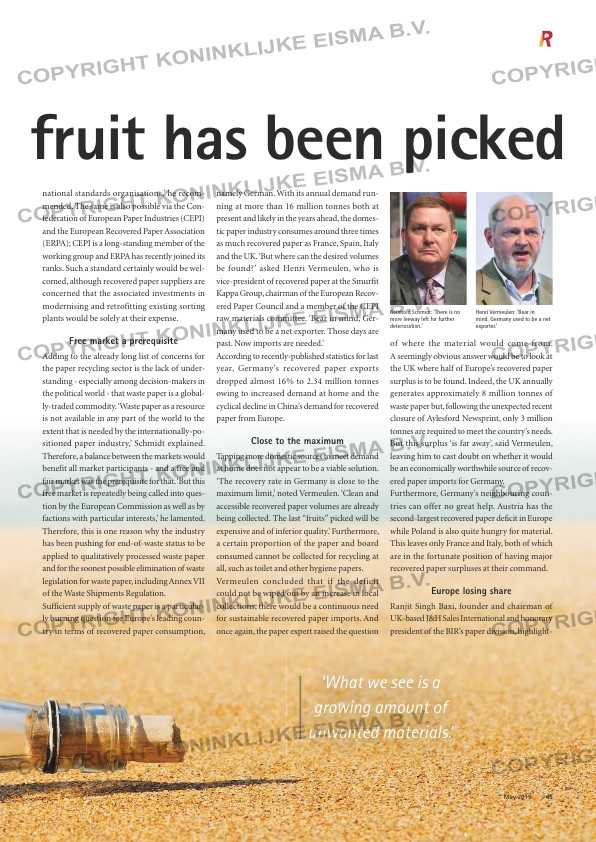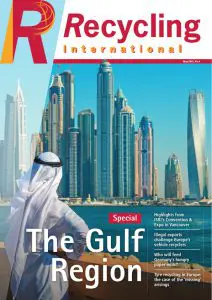Page 45 from: May 2015

45May 2015
national standards organisations,’ he recom-
mended. The same is also possible via the Con-
federation of European Paper Industries (CEPI)
and the European Recovered Paper Association
(ERPA); CEPI is a long-standing member of the
working group and ERPA has recently joined its
ranks. Such a standard certainly would be wel-
comed, although recovered paper suppliers are
concerned that the associated investments in
modernising and retrofitting existing sorting
plants would be solely at their expense.
Free market a prerequisite
Adding to the already long list of concerns for
the paper recycling sector is the lack of under-
standing – especially among decision-makers in
the political world – that waste paper is a global-
ly-traded commodity. ‘Waste paper as a resource
is not available in any part of the world to the
extent that is needed by the internationally-po-
sitioned paper industry,’ Schmidt explained.
Therefore, a balance between the markets would
benefit all market participants – and a free and
fair market was the prerequisite for that. ‘But this
free market is repeatedly being called into ques-
tion by the European Commission as well as by
factions with particular interests,’ he lamented.
Therefore, this is one reason why the industry
has been pushing for end-of-waste status to be
applied to qualitatively processed waste paper
and for the soonest possible elimination of waste
legislation for waste paper, including Annex VII
of the Waste Shipments Regulation.
Sufficient supply of waste paper is a particular-
ly burning question for Europe’s leading coun-
try in terms of recovered paper consumption,
namely German. With its annual demand run-
ning at more than 16 million tonnes both at
present and likely in the years ahead, the domes-
tic paper industry consumes around three times
as much recovered paper as France, Spain, Italy
and the UK. ‘But where can the desired volumes
be found?’ asked Henri Vermeulen, who is
vice-president of recovered paper at the Smurfit
Kappa Group, chairman of the European Recov-
ered Paper Council and a member of the CEPI
raw materials committee. ‘Bear in mind, Ger-
many used to be a net exporter. Those days are
past. Now imports are needed.’
According to recently-published statistics for last
year, Germany’s recovered paper exports
dropped almost 16% to 2.34 million tonnes
owing to increased demand at home and the
cyclical decline in China’s demand for recovered
paper from Europe.
Close to the maximum
Tapping more domestic sources to meet demand
at home does not appear to be a viable solution.
‘The recovery rate in Germany is close to the
maximum limit,’ noted Vermeulen. ‘Clean and
accessible recovered paper volumes are already
being collected. The last “fruits” picked will be
expensive and of inferior quality.’ Furthermore,
a certain proportion of the paper and board
consumed cannot be collected for recycling at
all, such as toilet and other hygiene papers.
Vermeulen concluded that if the deficit
could not be wiped out by an increase in local
collections, there would be a continuous need
for sustainable recovered paper imports. And
once again, the paper expert raised the question
of where the material would come from.
A seemingly obvious answer would be to look at
the UK where half of Europe’s recovered paper
surplus is to be found. Indeed, the UK annually
generates approximately 8 million tonnes of
waste paper but, following the unexpected recent
closure of Aylesford Newsprint, only 3 million
tonnes are required to meet the country’s needs.
But this surplus ‘is far away’, said Vermeulen,
leaving him to cast doubt on whether it would
be an economically worthwhile source of recov-
ered paper imports for Germany.
Furthermore, Germany’s neighbouring coun-
tries can offer no great help. Austria has the
second-largest recovered paper deficit in Europe
while Poland is also quite hungry for material.
This leaves only France and Italy, both of which
are in the fortunate position of having major
recovered paper surpluses at their command.
Europe losing share
Ranjit Singh Baxi, founder and chairman of
UK-based J&H Sales International and honorary
president of the BIR’s paper division, highlight-
Reinhold Schmidt: ‘There is no
more leeway left for further
deterioration.’
Henri Vermeulen: ‘Bear in
mind, Germany used to be a net
exporter.’
‘What we see is a
growing amount of
unwanted materials.’
All the low-hanging fruit has been picked
RI 4-bvse paper.indd 45 30-04-15 14:52



